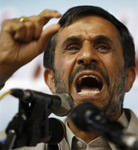 AFP: President Mahmoud Ahmadinejad said on Monday he is ready “to be the first man in space” under Iran’s ambitious programme which aims to send a human being into orbit by 2020.
AFP: President Mahmoud Ahmadinejad said on Monday he is ready “to be the first man in space” under Iran’s ambitious programme which aims to send a human being into orbit by 2020.  TEHRAN (AFP)— President Mahmoud Ahmadinejad said on Monday he is ready “to be the first man in space” under Iran’s ambitious programme which aims to send a human being into orbit by 2020.
TEHRAN (AFP)— President Mahmoud Ahmadinejad said on Monday he is ready “to be the first man in space” under Iran’s ambitious programme which aims to send a human being into orbit by 2020.
“Our youth are determined to send a man into space within the next four, five years, and I’m sure that will happen,” he said during a ceremony in Tehran where two new Iranian-made satellites were unveiled, according to ISNA news agency.
“I’m ready to be the first Iranian to be sacrificed by the scientists of my country and go into space, even though I know there are a lot of candidates,” Ahmadinejad quipped.
He added to the buoyant atmosphere, saying he was willing to “auction (himself) and donate” the money to the Iran’s space programme, which has shrunk because of international economic sanctions over Tehran’s controversial nuclear drive, ISNA reported.
The presidency website showed pictures of Ahmadinejad at the ceremony with what was purportedly Pishgam (pioneer), the monkey sent into orbit by Tehran last week.
The monkey’s launch was presented by the Islamic republic as a first step towards sending a human into orbit by 2020.
Ahmadinejad unveiled on Monday two small satellites, named “Nahid” and “Zohreh” (Venus in Farsi and Arabic, respectively).
Nahid, an observation satellite equipped with solar panels, is intended to orbit at an altitude of between 250 and 370 kilometres (155 to 230 miles). Iran has put three other small satellites into the same orbit since 2009.
Zohreh is a geostationary communications satellite that will be placed at an altitude of 36,000 kilometres (22,370 miles), something Iran has never tried before.
No launch date was given.
Iran’s space programme deeply unsettles Western nations, which fear it could be used to develop ballistic missiles capable of carrying nuclear warheads they suspect are being developed in secret, despite denials from Tehran.
The technology used in space rockets can also be used in ballistic missiles. The UN Security Council has imposed an almost total embargo on the export of nuclear and space technology to Iran since 2007.
Tehran denies its space programme has any link with its alleged nuclear ambitions.


